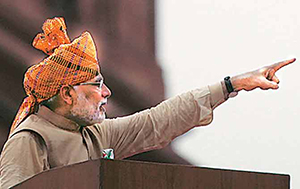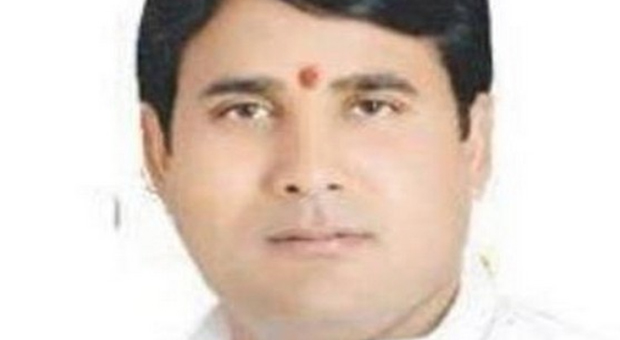New Delhi, Aug 15: Declaring that India will not bow before terrorism, Prime Minister Narendra Modi today asked the youth who have taken to violence to join the mainstream even as he brought up Pakistani atrocities on people of Baluchistan and PoK, saying that they have thanked him to do so.
Though Modi did not make any reference to Kashmir valley which is witnessing violence after the killing of Hizbul Commander Burhan Wani, he accused Pakistan of glorifying terrorists and celebrating killings in India. This was an obvious reference to Wani who has been hailed as a martyr by Pakistan, which was not directly named by him.
In his 93-minute Independence Day address to the nation amidst tight security, Modi said, "From the ramparts of the Red Fort, I want to express my gratitude to some people --the people of Baluchistan, Gilgit and Pak-occupied-Kashmir-- for the way they whole-heartedly thanked me, the way they expressed gratitude to me, the way they conveyed their goodwill to me recently."
This is for the first time the disturbed areas in the control of Pakistan have been mentioned by any Prime Minister during his Independence speech. The remarks also come in the backdrop of recent comments by Modi during an all-party meet on Kashmir that the time had come to expose the atrocities committed "by our neighbouring nation" in Baluchistan and the areas of J&K under its illegal occupation.
The Prime Minister asked the international community to judge the behaviour of India and Pakistan in the context of terror attacks in each other's country.
"When children were killed in terror attack on a school in Peshawar (about two years back), there were tears in our Parliament. Indian children were traumatised. This is the example of our humanity. But look at the other side where terrorism is glorified," Modi said.
Asserting that India will not yield to terrorism and violence, the Prime Minister asked youths to return to the mainstream by shunning the path of violence, comments which are seen as a message to youth of Kashmir.
"I am telling those youths that there is time left, come back and join the mainstream. Realize your parents' aspirations. Lead a peaceful life. The path of violence has never benefited anyone," he said.
Attired in his trademark half sleeves kurta and sporting a Rajasthani turban, Modi devoted bulk of his address on the occasion of the 70th Independence Day to presenting in effect a report card of his government's work particularly in boosting economic growth, ease of doing business and welfare schemes for the poor and farmers.
During his address, the Prime Minister also made two announcements - an increase of 20 per cent in the pension of freedom fighters and that medical costs of up to Rs 1 lakh for BPL families will be borne by the government.
Modi, who has spoken out against atrocities on Dalits in the recent days, said a strong country cannot be built without a strong society which is based on social justice. He advocated a "tough and sensitive" approach to tackle the age- old social evils including castism or untouchability.
Asserting that social harmony was the key to the nation's progress, Modi said,"What lord Buddha, Mahatma Gandhi, saint Ramanajucharya, B R Ambedkar, all our holy scriptures saints and teachers have stressed is social unity. When society breaks, the empire disintegrates. When a society is divided into touchables and untouchables; upper and lower (castes), then such a society cannot last."
Talking about economic and social sectors, he said he tries to adopt the strategy of "reform, perform and transform" while avoiding populism and asserted that march from self- governance to good-governance is a resolve of entire nation which will need sacrifices.
Hitting out at the UPA government, he said the previous dispensation was shrouded in allegations while his government was surrounded by expectations. "When hope gives rise to expectations, it gives us energy to move faster towards 'Suraj' (good governance)," he added.
The Prime Minister also gave details of various initiatives undertaken by his government to promote ease of doing business, tackle corruption, provide good healthcare to poor people and benefits to farmers.






Comments
Dear Modiji, Sharan Pumpwell, a well known ringleader suggested you to deploy military to protect Go Matha, now who will be in LOC if military doing silly work your RSS, BD, VHP goondas with sword and Iron Rods....??
Please ask your monkey team to stop bow bow
Bow, bow, is enough yar....
.Kuch karke dikha yar ....
YES ABSOLUTELY INDIANS WONT BOW TO TERROR OUTFITS LIKE RSS, ISIS, BD, SRS ABVP, VHP ETC AND YOUTHS NEED TO SHUN VIOLENCE OF THESE GOONS
Add new comment